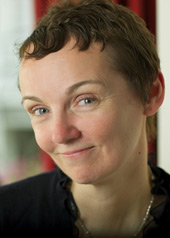A deeper focus on the patient perspective at ADA this year
By Kelly Close
 The end of June means we’re halfway through the year and we’ve just completed another ADA meeting. We’re lucky to attend each year, since there’s no finer barometer of just where we stand in the search for better therapies, better devices, and better outcomes – not to mention better lives. I wrote last month how special it was that the ADA was holding this year’s meeting in diaTribe’s hometown of San Francisco, and in this issue I’m proud to present our latest edition of conference pearls, which examines the biggest takeaways from this ADA: major progress on the artificial pancreas, a new and exciting position statement for type 1 diabetes, updates on novel drug combination therapies, and much more! Please read more about advances in type 1 diabetes and type 2 diabetes, as well as about the recent FDA approval of MannKind’s Afrezza for both type 1 and type 2 – an exciting month indeed!
The end of June means we’re halfway through the year and we’ve just completed another ADA meeting. We’re lucky to attend each year, since there’s no finer barometer of just where we stand in the search for better therapies, better devices, and better outcomes – not to mention better lives. I wrote last month how special it was that the ADA was holding this year’s meeting in diaTribe’s hometown of San Francisco, and in this issue I’m proud to present our latest edition of conference pearls, which examines the biggest takeaways from this ADA: major progress on the artificial pancreas, a new and exciting position statement for type 1 diabetes, updates on novel drug combination therapies, and much more! Please read more about advances in type 1 diabetes and type 2 diabetes, as well as about the recent FDA approval of MannKind’s Afrezza for both type 1 and type 2 – an exciting month indeed!
My favorite phrase to describe the ADA is – “a meeting of the minds.” So much brainpower was assembled this past month in San Francisco’s Moscone Center, and all of it geared toward diabetes. For the eighth year, The diaTribe Foundation and Taking Care Of Your Diabetes (TCOYD) hosted the annual Diabetes Forum, in which TCOYD founder Dr. Steven Edelman and I were joined by five renowned experts in the field. When you add up the years that the seven people on stage have been working on, thinking about, or in some cases living with diabetes, it totals more than a century of experience. By way of context, insulin itself wasn’t discovered until 1922. If you consider the over 250 people who attended the Diabetes Forum and assume that each has an average of ten years’ experience with diabetes – and believe me, that’s an underestimate – then their combined experience takes us all the way back to the first descriptions of diabetes by physicians in the ancient Mediterranean.
The ADA gave us plenty of reasons to feel optimistic –we deal with many of the biggest ones in conference pearls – but one of the most notable developments has little to do with any particular device or therapy, and that’s the greater acknowledgment of the patient voice. I must admit I’m probably a little biased here, as ADA was kind enough to let me run an entire panel during its sessions on the patient perspective. In just 30 short minutes, I tried to capture all the difficult realities that can make diabetes so hard to live with: the challenges of finding good food and time to exercise in a modern society that leaves little time for either; the fact that there are no vacations from this 24/7/365 disease; the fact that diabetes is “invisible”– one that other people won’t necessarily know we have unless we tell them – but it also carries a social stigma when we do tell people; and the many difficulties that come with taking care of children with diabetes.
I detailed all those frustrations so that my audience of researchers and caregivers could be reminded that there is a lived component to diabetes that many of them can sometimes forget. That’s why I hope my calls for big strides in diabetes research and care will be heeded. That includes better access to care for all patients, improved care in schools, a more patient-centered regulatory process, and technology that is both easy to use and provides peace of mind. If all of this year’s ADA attendees can go forward with a greater understanding of people with diabetes, then the conference will have been a success.
very best,

Kelly L. Close
Never miss an update by signing up here to receive free updates on future diaTribe articles.







